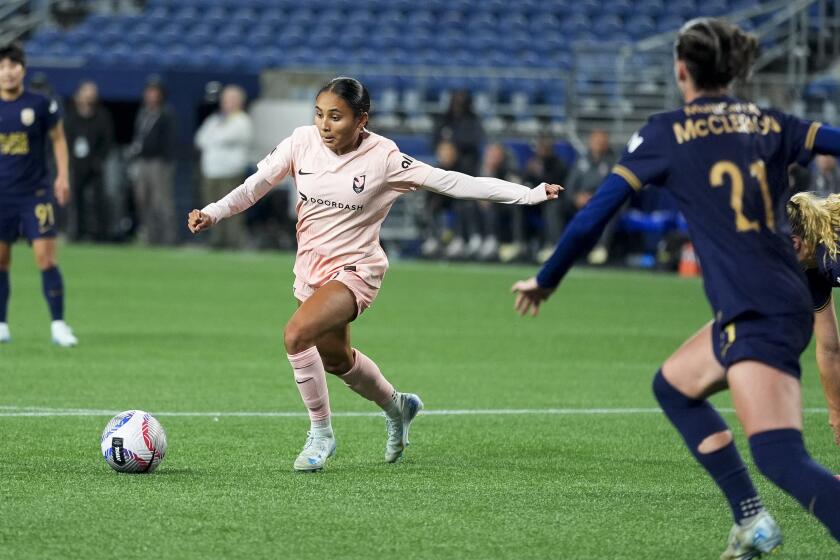U.S. has stiff competition in trying to land 2022 World Cup
- Share via
The cards have been dealt and now it is up to 22 men from 22 countries to decide how to play them. On Thursday, in the snowy Swiss city of Zurich, they will show their hand.
At stake are the World Cup tournaments of 2018 and 2022 and the billions of dollars that staging soccer’s quadrennial world championship generates, not to mention the global prestige it brings to the host nation.
The U.S. is one of five candidates for 2022 and it has employed the likes of former President Clinton to make its pitch to FIFA’s 22-man executive committee. That will take place Wednesday.
In the running against the U.S. are Qatar, Australia, South Korea and Japan. The deep-pocket Qataris are the main worry.
Qatar might have only 1.6-million people, it might be no larger than Connecticut and its summer temperaturessoar into the 100s. But it wants the World Cup and has the financial clout to get it. Even now, 12 years ahead of the tournament and hours ahead of the vote, Qatar has five extraordinary stadiums under construction.
British bookmaker William Hill has Qatar as a 4-to-9 favorite to win the 2022 World Cup vote, ahead of Australia at 3 to 1 and the U.S. at 7 to 2. Japan and South Korea, co-hosts of the 2002 World Cup, are at 33 to 1 and 40 to 1, respectively.
“The World Cup has been to Africa, now it is time for the Middle East,” said Qatar-backer and former French star Zinedine Zidane.
England is one of four candidates for 2018, and its high-profile figures in Zurich to do some friendly arm-twisting include Prince William, Prime Minister David Cameron and soccer royalty in the shape of Bobby Charlton and David Beckham.
England was once the favorite, but a series of print and televised reports in the English media that exposed bribery and corruption within FIFA has lengthened the odds of the tournament returning to England for the first time since 1966.
Now, it appears that Russia or the joint bid by Spain/Portugal is the 2018 frontrunner. Both claim to have eight votes in the bag, which, if true, means there are only six left to be split between England and the fourth bidder, a joint effort by the Netherlands/Belgium.
Already there are rumors of “arrangements” being made whereby some of Spain/Portugal’s votes will go to underdog Netherlands/Belgium on the first round of voting in order to eliminate England. The bid that receives the fewest votes drops out in each round.
Bookmaker William Hill has Russia as a 4-to-6 favorite to get the 2018 Cup, with Spain/Portugal at 11 to 4, England at 3 to 1 and the Netherlands/Belgium at 16 to 1.
The decision to hold both votes simultaneously ostensibly was made to maximize income from sponsors and TV networks, but it has served only to foster behind-the-scenes deal-making and vote-trading.
Author Simon Kuper, writing last week in England’s Financial Times, put it best.
“The campaign to host these World Cups is much like a conclave of cardinals choosing a pope,” Kuper wrote. “It’s a campaign waged mostly behind firmly closed doors, and the very secrecy of the process, and the desperation of the nine bidders to win, invites corruption.”
Even FIFA has admitted the process is flawed.
The easy decision would be to give the tournaments to England and the U.S. Both countries have the know-how and the infrastructure already in place and could stage the World Cup next week if necessary.
But FIFA’s executive committee is unlikely to award consecutive World Cups to wealthy English-speaking countries. The best bet for the U.S. to prevail in 2022 is for England to fail in 2018.
Another factor coming into play is the 2026 tournament. Only by turning its back on the four Asian candidates and awarding the U.S. the 2022 event would FIFA be free to have China as host in 2026. The same continent cannot stage consecutive tournaments.
Joseph “Sepp” Blatter, FIFA’s Swiss president, has visions of a Nobel Prize. What better way to achieve that aim than to be the man who first brought the World Cup to Africa (South Africa, 2010), to the former communist bloc (Russia, 2018) and to the Middle East (Qatar, 2022)?
Meanwhile the lobbying in Switzerland this week is intense and the arguments have little to do with the relative merits of the respective bids.
Japan, for instance, envisioned an extremely futuristic and high-tech World Cup, sharing it with the world via 200 high-definition cameras at each game transmitting images to be viewed on huge 3D screens.
South Korea hitched its wagon to the peace sign, offering to share the tournament with North Korea. That, of course, was before things turned sour between Seoul and Pyongyang, and the Korean bid is now seen as a distinct long shot.
The fact that Japan and South Korea were co-hosts only eight years ago also acts against them.
Australia would be new territory for FIFA and the country showed with the 2000 Sydney Olympics how well it can deliver a major sporting event, but the fact that the country’s prime minister, Julia Gillard, did not travel to Zurich signals that the bid is likely dead in the water.
That would leave the U.S. sitting pretty if it were not for Qatar.






